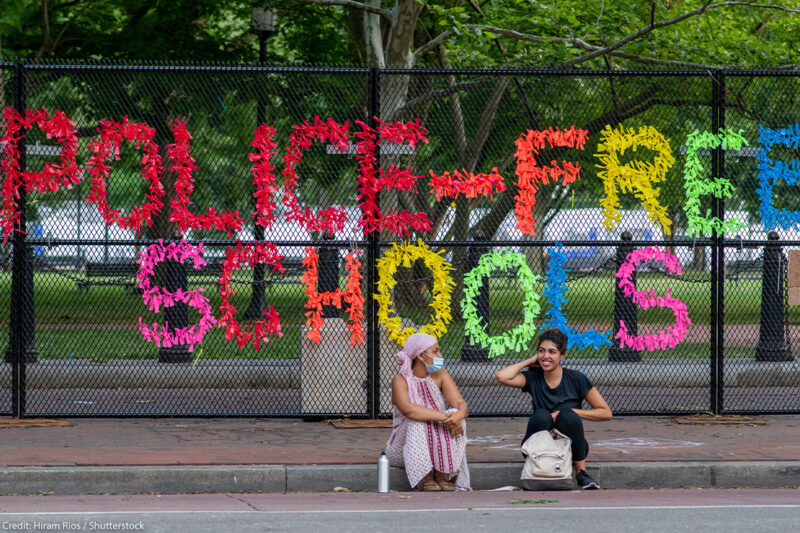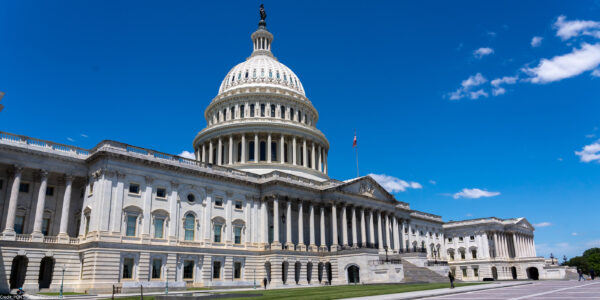Safe and Healthy Schools Lead With Support, Not Police


As schools begin to reopen for the new school year, students like J.W. are dreading the return to hallways patrolled by police officers who are trained and ready to detain, handcuff, and arrest students.
After being bullied in his Texas high school one day, J.W., a 17-year-old Black student with emotional and intellectual disabilities, had an outburst and tried to use a coping strategy in response — going to the “chill-out” room. This is an approach that students with disabilities use to help self-regulate their emotions and avoid escalation. When J.W. found the chill-out room occupied, he had a fallback strategy: Leave school and walk home to cool down. School officials responded by blocking his way out and radioing in the school-based police officer.
Instead of trying to de-escalate the situation, the officer pressed J.W. against a door and fired a taser gun directly on J.W.’s body until he fell onto the floor face-down. J.W. was handcuffed after 15 seconds of tasering. He was taken to the hospital and missed several months of school while experiencing intense anxiety and PTSD. In the face of these facts, a Fifth Circuit panel ruled that the tasing of J.W. was an act of school discipline that couldn’t be challenged under the Fourth Amendment. We recently filed an amicus brief in support of J.W. arguing that in dismissing his claims, the court dangerously and incorrectly suggested that students lose their constitutional protections against excessive force — including from police officers — when they enter schools.
Sadly, while J.W.’s experience was singularly horrifying, his encounter was one of many. Nationally, students of color and students with disabilities are up to two times more likely to be referred to police and arrested in schools. During the 2017-2018 school year, students with diagnosed disabilities represented 16 percent of national enrollment, but nearly 30 percent of arrests in school.
In response, communities across the country are pushing their schools to divest funding from police and reinvest funds in student mental health and other supportive services. But federal funding plays an important role — not only in actual dollar sums, but in determining which educational services are deserving of investment — and Congress must do its part. That’s why we’re calling on Congress to pass the Counseling not Criminalization in Schools Act, critical legislation that would eliminate federal funds for police in schools and instead redirect those funds to supportive services for students.
Passing the Counseling not Criminalization in Schools Act is an essential step Congress can take to make our schools safe and healthy learning environments. Federal funding has played a pivotal role in seeding and expanding the presence of police in schools. The Department of Justice’s COPS Office awarded $50 million to 160 school districts and municipalities for school police in 2020 alone. At the same time, there are 14 million students in schools with police and no nurses, social workers, or psychologists across our country.
Black and Brown students are more likely to attend policed schools. As a result, tens of thousands of Black, Indigenous, and Latinx students, including girls of color, students with disabilities, LGBTQ students, and other marginalized students, are over-criminalized, physically and mentally harmed, and funneled into the school-to-prison-and-deportation pipeline every year.
The ACLU recently wrote to the Department of Education outlining the devastating consequences of police in schools witnessed through our work across the country. In South Carolina, where the ACLU is challenging the criminalization of students for being “disorderly,” “disturbing,” “boisterous,” or “obnoxious,” almost three quarters of juvenile disorderly conduct arrests occur in school. Police in schools arrest Black students for disorderly conduct more than six times as often as their white classmates. Students with disabilities are charged with disorderly conduct instead of receiving emotional and mental health supports through school-based service plans. School policing drives harmful contacts with the criminal and juvenile systems; it also undermines the goals of the education system.
Schools that received federal funding to hire more police actually experienced a decrease in graduation rates, while those that employed more mental health providers saw improved student engagement and graduation rates. Schools that used other types of supports, including restorative and trauma-informed practices, saw beneficial results, including reduced disciplinary incidents, suspensions, dropouts, and expulsions. Investing in mental health resources, support personnel, and interventions that promote positive student interactions can make schools safer and healthier learning environments, while also helping to combat the discriminatory school-to-prison pipeline that targets students of color and students with disabilities.
Instead of funding the policing, tasing, and handcuffing of our students, Congress should redirect funding to proven solutions — including mental health professionals who are trained to support students. The Counseling Not Criminalization in Schools Act would eliminate the use of federal funds for maintaining police in schools and give schools $5 billion in grant funding to help hire counselors, social workers, and other trauma-informed support personnel instead. We need to invest in proven school-based supports and mental health services for our students. It’s time for Congress to take action.


